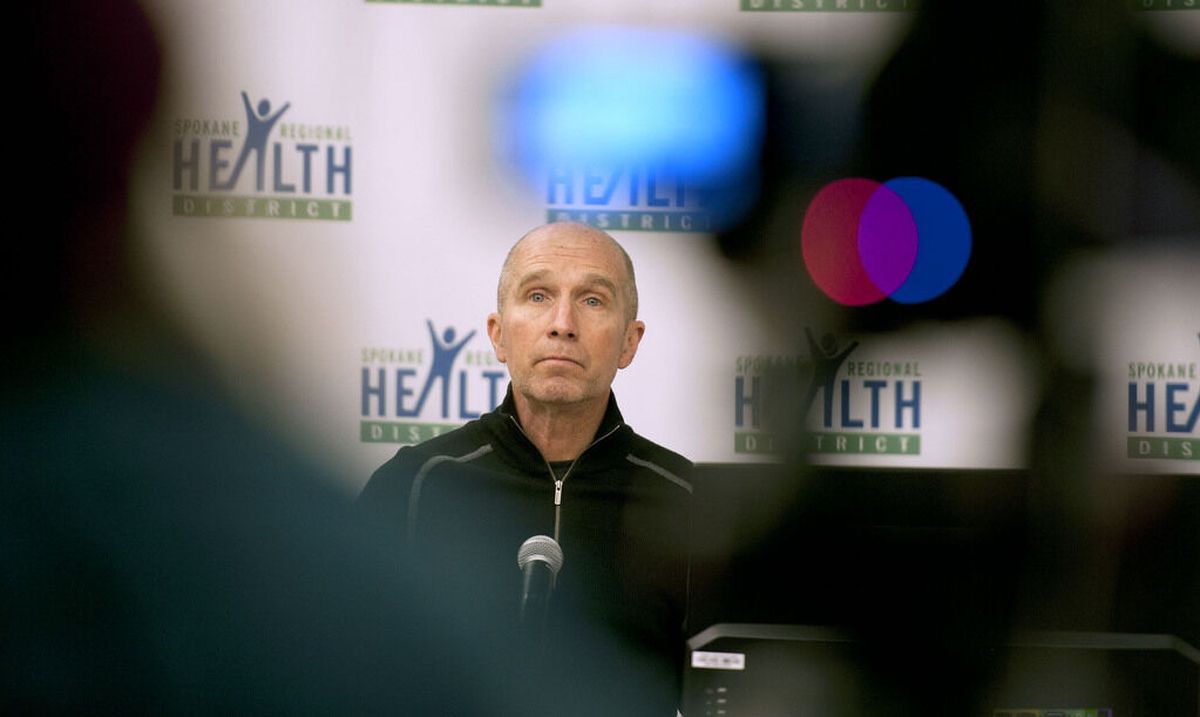With the abrupt move by the Spokane Regional Health District’s administrator to try and force out county Health Officer Dr. Bob Lutz amid the COVID-19 pandemic , questions linger about Lutz’s future – and the bureaucratic dealings behind the attempted ouster.
Despite confusing and contradictory announcements from health district officials, staff and board members, Spokane County technically still has a health officer, and will continue to have one until the board votes to remove him or he resigns.
It’s a complicated process.
The district is run by an administrator, and the health officer reports to the administrator. This change is fairly recent and occurred under the previous long-time administrator, Torney Smith, and Lutz..
But the Board of Health’s own bylaws bar the administrator from firing the health officer without the board’s approval, and state statutes bar the health board from taking action on the health officer’s employment without an open public meeting.
The health board – elected officials directly responsible for hiring and firing the district administrator – also approve the hiring and firing of the health officer.
Here’s a look at how the board works and what that could mean for Lutz – and the county.
A potential political element
The Spokane Regional Health District Board of Health has a 12-member board, with representatives from the cities of Spokane, Spokane Valley, a smaller town mayor, the three county commissioners and their three appointees.
Not all local health jurisdictions have a 12-member board . Benton-Franklin Health District, for example, is governed by only the county commissioners in each county.
Since county commissioners are elected positions, that leads to the potential for politics to influence the Board of Health. This was apparent in the Board of County Commissioner’s request for Lutz to move the county ahead in the state’s reopening phases throughout the pandemic.
With each commissioner getting to appoint an at-large board member, there is even more potential for political influence.
One such appointee, Jason Kinley, spoke at a rally earlier this summer organized to protest the statewide shutdown due to the pandemic. He was appointed to the board by Commissioner Josh Kerns.
Meanwhile, in Washington, public health jurisdictions are funded by and through the county, giving commissioners yet more control over public health matters.
A new hierarchy
Previously, the health office was the head of the health district in Spokane. That was unusual. Most health districts in the state, Smith said, were run by an administrator.
The difference between the two positions is stark, and the structure of having an administrator over the health officer, Smith said, was a way to take administrative duties – like payroll, budget, human resources – off the doctor’s plate.
“I don’t have a medical degree, and our doctors, quite frankly, have not been educated in running a business,” Smith said.
In 2018, the district changed the bylaws and made the administrator the head of the agency, with the health officer reporting to the administrator.
Smith said putting the administrator at the top let him tend to the business of running the health district, and Lutz took care of the medicine and science.
Who has the power?
The bylaws enacted in 2018 remain in place. They state how a health officer can be hired and fired.
“The board of health shall approve the appointment and termination of a District Health Officer,” the board bylaws state.
Approval is later addressed in the bylaws: “Approval of all actions taken by the board shall be by a majority of the votes cast.”
State law also prescribes protocols for removing a health officer, including a hearing about the reasons for that person’s removal.
“No term of office shall be established for the local health officer but the local health officer shall not be removed until after notice is given, and an opportunity for a hearing before the board or official responsible for his or her appointment under this section as to the reason for his or her removal,” state law says.
Smith said the bylaws were written this way in order to avoid “exactly what is happening now.” He said having the termination of a health officer come before the board was in place so that the administrator couldn’t just fire the doctor.
The intention was also not to hide the proceedings, Smith said.
Smith retired in early 2019, and the board began their search for a replacement.
The board picked Amelia Clark to lead the district in September 2019, after they interviewed four candidates. Clark has experience working in administration in the health care industry in her home state of Indiana, and she is currently working towards her doctorate degree in global health leadership.
The 2018 Board of Health bylaws also stipulate that the administrator is beholden to the board, both hired and fired by them.
In a way, the administrator is caught in the middle of the board members, who might bring ideologies or political agendas to the district, and the health officer, whose job it is to advocate for and promote public health.
Critics call for ‘a better model’
As of Saturday, Lutz had not submitted his resignation to the health district, setting up the potential for the board to call a special meeting to fire him.
Board member and mayor of Millwood Kevin Freeman said in an interview Friday he initially didn’t realize the bylaws required the health administrator to get the board’s permission before she took action against the health officer, just that she had to notify them of what she was doing.
He said after Thursday’s meetings about Lutz, he was under the impression Clark was going to take some sort of action against Lutz, which could include termination, but the board never voted on terminating Lutz.
He said the board will have to vote on whether to remove him if the effort does go forward, which would put them in a difficult situation because they normally lean on the expertise of the health administrator when making personnel decisions, and they have to weigh her concerns with the public’s.
“If we as a district vote to retain Dr. Lutz, we are going against the will of the administrative officer, which is the person that we have directly hired to run the district,” he said on Friday. “I guess at some point, we have to decide who we are going to put our faith in: the person that we hired to run the district, or the employee of the district.”
Chuck Hafner, an appointed member of the Board of Health, also said the board never took a vote on Lutz’s termination, but declined to say anything else that they discussed, citing the rules of executive session.
County Commissioners Al French, Josh Kerns and Mary Kuney have not responded to repeated requests for comment.
The health district could not say on Friday whether Lutz was still employed with the district. Since he has not been terminated according to the bylaws and did not submit his letter of resignation, he presumably is.
The health officer’s role goes beyond promoting science and public health. They need a medical license for the district to perform services . For Smith, that’s a pretty pressing issue, should Lutz resign or be fired.
“If Bob gets terminated, whose license are they operating under?” he said.
At least one other health officer has been pushed out over unknown administrative issues, when the Board of Health unanimously voted to fire former health officer Dr. Kim Thorburn in 2006.
When she was health officer, Thorburn was known for being an outspoken advocate for public health and frequently clashed with the board and others.
It took more than two years for the Board of Health to find a new health officer.
The board at the time was led by County Commissioner Todd Mielke and included Mayor Mary Verner and County Commissioner Mark Richard.
The vote happened during a public meeting, which included a large group of Thorburn’s supporters who were outraged by the decision. When board members ousted Thorburn , they also said she was qualified for the job, but had to go due to internal administrative problems.
Thorburn compared Lutz to Dr. Anthony Fauci and said public political struggles like what happened Friday can confuse and undermine public health – and can undercut the message a public health leader is trying to give.
Thorburn said she is against public health boards made up of elected officials and political appointees because it allows board members who disagree with a policy or have a political agenda to interfere with public health.
She said board members with medical backgrounds should be the people making decisions about public health.
“If health boards are to be retained, that would be a better model,” she said. “We see these kind of conflicts happen … in the middle of a public health emergency, of all things. It just reinforces that maybe it’s time to take a look at how local health jurisdiction oversight and policy making occurs in Washington.”
Arielle Dreher’s reporting for The Spokesman-Review is funded in part by Report for America and by members of the Spokane community. This story can be republished by other organizations for free under a Creative Commons license. For more information on this, please contact our newspaper’s managing editor.

















